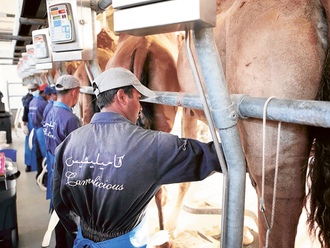I am a 14-year-old girl, 155cm tall and weigh 53kg. I attained puberty when I was 11. My question is: will I grow taller? And can you please suggest some tips to increase my height?
JFN, by email
Height depends on many factors including gender, race and your parents' height. Height in the early years depends mainly on nutrition, then on various hormones. Children grow at a steady rate for the first 10 to 12 years of their lives, then, experience a growth spurt for the next two years. After this, their growth rate slows until it stops at the end of puberty.
Girls usually complete puberty by the age of 15 to 17, while boys usually complete puberty by around 18. The final stages of this growth occur in the epiphysis, or growth plates which are at the end of the long bones (arms and legs). During puberty they begin to solidify. It is agreed that once the epiphysis are fused, further growth is not possible. In adults whose growth plates are fused, even overproduction of growth hormones will not help them increase their height.
In your case, you may have a normal growth spurt for another year. Girls grow between 6.5cm and 11.5cm each year during their growth spurt. You must eat a diet rich in protein, iron, vitamin B12 and other minerals. These nutrients can be found in food such as eggs, nuts, pulses, milk, poultry, and green leafy vegetables. Exercise regularly and have a balanced diet. Green gram is an easily digestible protein supplement. Attempting some posture exercises may make a difference to your standing height. Intake of Ayurveda tonics like Ashwagandha, Vidaryadi ganam, and sesame seeds (after consulting a doctor) can be useful.
My husband suffers from flatulence. He is 40 years old. His doctor has prescribed him a few tablets but they have not been helpful. He used to regularly drink coffee and tea, but now has reduced his intake of beverages. Please suggest a remedy for this condition. Incidentally, my son who is seven years old also suffers from the same problem.
VK, by email
Bloating, burping and passing gas are natural and are usually caused by swallowed air (while eating) or due to the breakdown of food through digestion; especially plant fibres. When gas doesn't pass through belching or flatulence, it can build up in the stomach and intestines and lead to bloating.
Bloating is often accompanied by abdominal pain. Flatulence may also be related to eating fatty food, stress or anxiety, smoking and irritable bowel syndrome (a condition characterised by abdominal pain or cramping and changes in bowel function). The treatment for his flatulence should be more personalised. Please consult an Ayurvedic doctor for a detailed diagnosis.
Meanwhile, he can try the following:
- Avoid or reduce eating food such as beans, peas, lentils, cabbage and onions, broccoli, cauliflower and bananas, apples and peaches.
- Eat less fatty food
- Avoid chewing gum and smoking
Ask me a question…
Well-being,
Friday,
Gulf News,
PO Box 6519, Dubai, UAE
Fax: 04 3421039
friday@gulfnews.com











